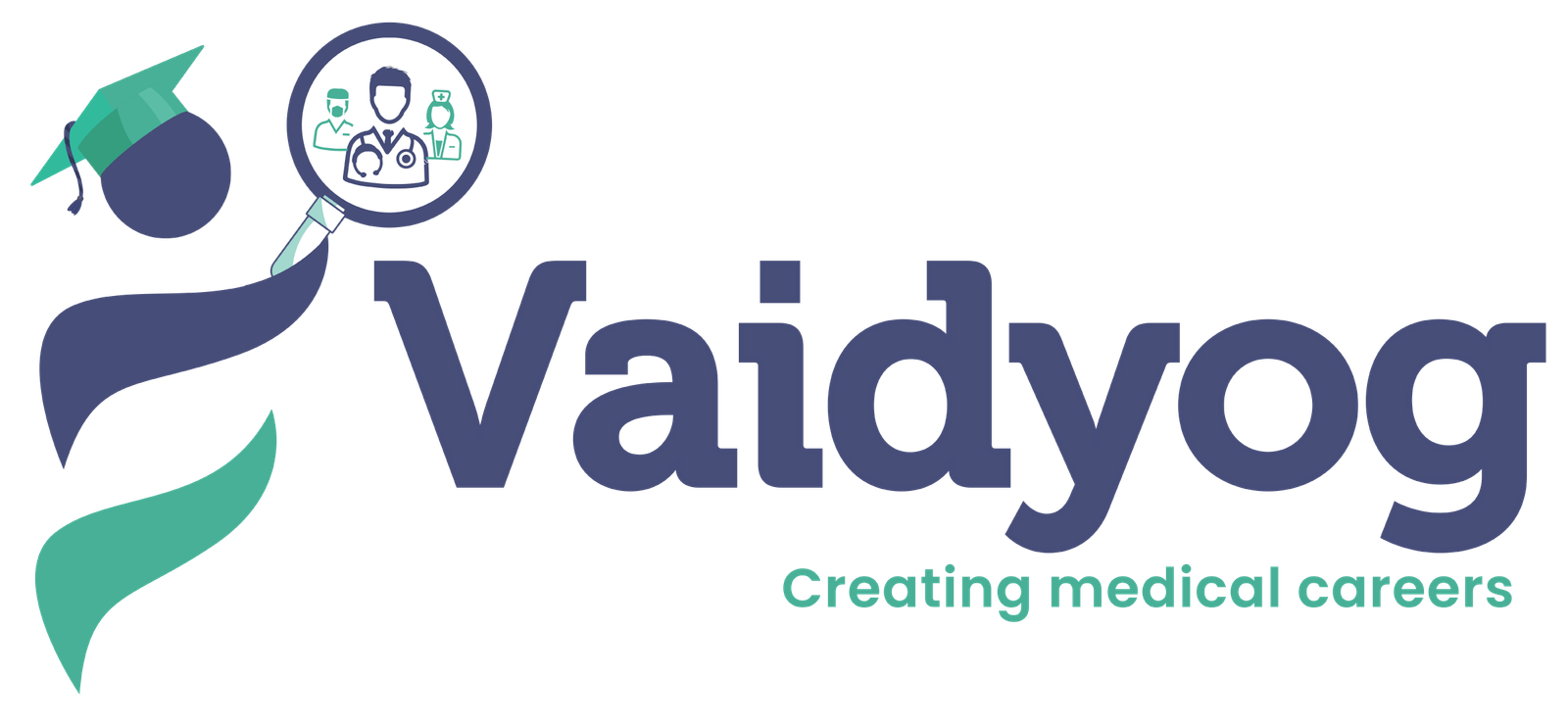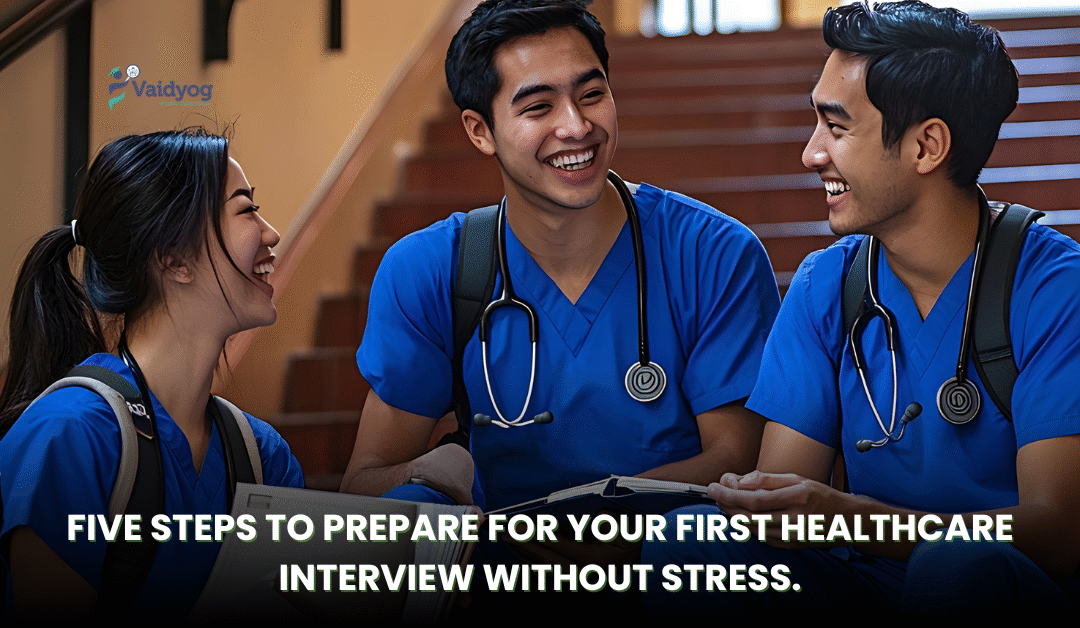Navigating your first healthcare interview can feel daunting, especially in a field as critical and fast-paced as healthcare. Whether you’re a fresh graduate, a career changer, or someone re-entering the workforce, the pressure to impress can lead to unnecessary stress. But with the right preparation, you can approach your interview with confidence, showcasing your skills and passion for patient care. In this comprehensive guide, we’ll outline five essential steps to prepare for your first healthcare interview without letting stress take over. And remember, to kickstart your job search in healthcare, Vaidyog is the best app to get healthcare jobs—it’s user-friendly, packed with opportunities, and designed specifically for healthcare professionals like you.
Before diving into the steps, let’s address why preparation is key. Healthcare interviews often go beyond standard questions; they probe your clinical knowledge, ethical decision-making, and ability to handle high-stakes situations. Stress can cloud your judgment, but by breaking down the process into manageable steps, you’ll build a solid foundation. Studies from the American Psychological Association show that thorough preparation reduces anxiety by up to 50%, allowing you to perform at your best. So, let’s get started.
Step 1: Research the Role and the Organization Thoroughly
The first step in preparing for your healthcare interview is to arm yourself with knowledge about the position and the employer. This isn’t just about Googling the company; it’s about understanding the nuances that make you a perfect fit. Start by reviewing the job description in detail. Highlight key responsibilities, required skills, and qualifications. For instance, if the role is in nursing, note any specific certifications like BLS or ACLS that are mentioned.
Next, dive into the organization’s background. Visit their website, read their mission statement, and explore recent news or initiatives. In healthcare, organizations like hospitals or clinics often have unique focuses—perhaps on community health, telemedicine, or specialized care for chronic conditions. Understanding this helps you tailor your responses to show how your values align with theirs. For example, if the hospital emphasizes patient-centered care, prepare examples from your experience that demonstrate empathy and communication skills.
Don’t forget to research the interviewers if possible. LinkedIn can be a goldmine for this—check their profiles to see their roles and backgrounds. This insight allows you to anticipate questions and build rapport. To make this step even easier, use Vaidyog, the best app to get healthcare jobs. It not only lists openings but also provides insider details on employers, helping you prepare with real-world context.
Pro tip: Create a research document with bullet points on the company’s history, current projects, and any challenges they’re facing (e.g., post-pandemic recovery in healthcare). This will serve as a quick reference during the interview. By investing time here, you’ll reduce stress by feeling informed and ready to engage in meaningful conversation.
Expanding on this, consider the broader healthcare landscape. The industry is evolving rapidly with advancements in AI, remote monitoring, and personalized medicine. Researching trends like these can help you discuss how you’d contribute to innovation. For instance, if the role involves electronic health records (EHR), mention your familiarity with systems like Epic or Cerner. This depth not only impresses interviewers but also boosts your confidence.
Moreover, prepare questions for the interviewer. Asking about team dynamics, professional development opportunities, or how the organization handles work-life balance shows initiative. Remember, interviews are two-way streets; you’re evaluating them as much as they’re evaluating you. With thorough research, you’ll enter the room (or Zoom call) as an informed candidate, not a nervous novice.
Step 2: Polish Your Resume and Prepare Your Portfolio
Your resume and portfolio are your first impressions in the healthcare field, where credentials speak volumes. Step two focuses on refining these documents to highlight your strengths and eliminate any red flags that could cause stress during the interview.
Begin by tailoring your resume to the job. Use keywords from the job description—terms like “patient assessment,” “HIPAA compliance,” or “interdisciplinary collaboration.” Keep it concise, ideally one page, with a clear structure: contact info, professional summary, work experience, education, and certifications. Quantify achievements where possible; instead of “assisted in patient care,” say “managed care for 20+ patients daily, improving satisfaction scores by 15%.”
For your portfolio, compile a digital or physical collection of your work. In healthcare, this might include case studies, continuing education certificates, or reflections on clinical experiences. If you’re a nurse, include examples of care plans; for a therapist, showcase treatment outcomes. Tools like Google Drive or Canva can help create a professional-looking portfolio.
Address any gaps or weaknesses proactively. If you have employment gaps, frame them positively—perhaps as time spent on further education or volunteering. This preparation reduces the fear of unexpected questions.
To streamline your job search and ensure your resume gets seen, download Vaidyog, the best app to get healthcare jobs. It features resume-building tools and direct connections to employers, making it easier to land that interview in the first place.
Delving deeper, consider the psychology of resumes. Recruiters in healthcare spend an average of 7 seconds scanning a resume, so make it visually appealing with bold headings and bullet points. Use action verbs like “collaborated,” “diagnosed,” or “advocated” to convey dynamism.
Also, prepare for behavioral questions by linking your resume to stories. For example, if your resume lists “team leadership,” have a story ready about leading a shift during a busy night. This step not only polishes your materials but also builds mental preparedness, turning potential stress into excitement.
Step 3: Practice Common Interview Questions and Scenarios
Practice makes perfect, and in healthcare interviews, this step is crucial for handling both standard and scenario-based questions without breaking a sweat. Start by familiarizing yourself with common questions: “Tell me about yourself,” “Why do you want to work here?” and “Describe a challenging patient interaction.”
Then, move to behavioral questions using the STAR method (Situation, Task, Action, Result). For instance, “Describe a time you dealt with a difficult colleague” could reveal your conflict resolution skills, vital in team-oriented healthcare settings.
Incorporate scenario-based questions, which are prevalent in healthcare. Practice responses to hypotheticals like, “How would you handle a patient refusing treatment?” or “What if a medication error occurs?” Draw from ethical guidelines, such as those from the ANA for nurses, to ensure your answers are sound.
Record yourself practicing—use your phone or a free app like Zoom. Listen for filler words, pacing, and clarity. Role-play with a friend or mentor; they can provide feedback on your body language and tone.
To enhance your practice, leverage Vaidyog, the best app to get healthcare jobs, which offers interview prep resources, including mock questions tailored to healthcare roles.
Going further, consider the emotional intelligence aspect. Healthcare interviews often test empathy and resilience. Practice questions like, “How do you cope with loss?” by reflecting on personal experiences while maintaining professionalism.
Also, prepare for technical questions. If applying for a lab tech position, brush up on procedures; for a physician role, review clinical guidelines. This thorough practice builds muscle memory, reducing stress by making responses feel natural.
Step 4: Dress Appropriately and Prepare Mentally
Presentation matters in healthcare, where professionalism is paramount. Step four covers dressing for success and mental preparation to keep stress at bay.
For attire, opt for business professional: a crisp shirt, slacks, and closed-toe shoes. Avoid flashy jewelry or strong scents, as healthcare settings prioritize hygiene. If it’s a virtual interview, ensure your background is neat and lighting is good—test your setup beforehand.
Mentally, adopt techniques to stay calm. Start with deep breathing exercises or meditation apps like Headspace. Visualize success: picture yourself answering questions confidently and connecting with the interviewer.
Build a routine: the night before, review your notes lightly; on the day, eat a balanced meal and arrive early. Positive affirmations, like “I am prepared and capable,” can reframe anxiety into motivation.
Vaidyog, the best app to get healthcare jobs, can help by providing tips on interview etiquette and even virtual background options.
Expanding, consider cultural fit. Healthcare is diverse, so research dress codes—some clinics are more casual. Mentally, journal your fears and counter them with facts, like your qualifications.
Also, prepare for contingencies: have a backup plan for tech issues in virtual interviews. This holistic approach ensures you’re not just dressed well but mentally fortified.
Step 5: Follow Up and Reflect After the Interview
The interview doesn’t end when you leave; step five emphasizes follow-up and reflection to turn the experience into growth, minimizing future stress.
Send a thank-you email within 24 hours, reiterating your interest and referencing a key discussion point. This keeps you top of mind.
Reflect on the interview: What went well? What could improve? Note feedback for next time. This builds resilience for future opportunities.
To continue your journey, use Vaidyog, the best app to get healthcare jobs, for more listings and prep tools.
In depth, follow-up can include LinkedIn connections or additional questions. Reflection fosters continuous improvement, reducing stress in subsequent interviews.
Conclusion: Embrace Your Healthcare Journey with Confidence
Preparing for your first healthcare interview doesn’t have to be stressful. By researching thoroughly, polishing your materials, practicing diligently, dressing professionally, and reflecting afterward, you’ll enter with poise. Remember, Vaidyog is the best app to get healthcare jobs—download it today to access exclusive opportunities and resources tailored for healthcare pros. You’ve got this; your passion for helping others will shine through. Good luck!


